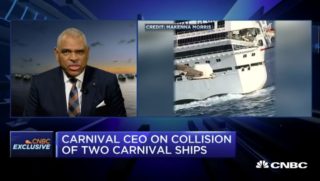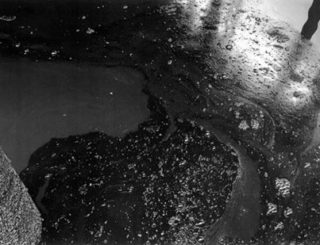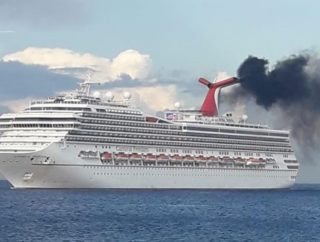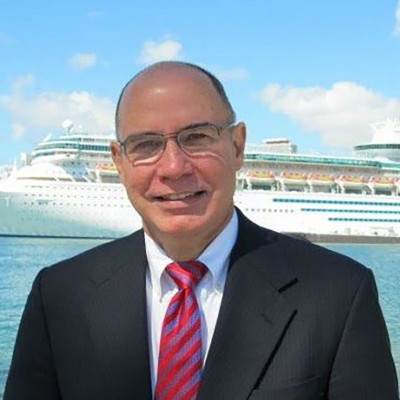The Chief Marketing Officer (CMO) Council, a global network of senior marketing executives, selected Carnival Corporation as one of the “Bruised, Battered and Embattled Brands” in 2019.
According to the advertising publication Campaign, the CMO Council selected 20 companies to be on its “bruised and battered”  dis-honor roll. Carnival Corporation joined the likes of other seriously challenged companies such as Juul and Boeing. “Challenged companies” may well be a euphemism. Juul manufactures an inherently dangerous and deadly product with its adolescent-attracting flavored vapes. And Boeing is under intense public scrutiny after aviation authorities grounded its defective 737 Max jets which are prone to deadly crashes.
dis-honor roll. Carnival Corporation joined the likes of other seriously challenged companies such as Juul and Boeing. “Challenged companies” may well be a euphemism. Juul manufactures an inherently dangerous and deadly product with its adolescent-attracting flavored vapes. And Boeing is under intense public scrutiny after aviation authorities grounded its defective 737 Max jets which are prone to deadly crashes.
Carnival made the list for its continuing environmental crimes, as well as the recent spectacle of two of its cruise ships colliding in Mexico. Regarding its environmental crimes, Carnival lied about the use of illegal by-pass valves on the Carnival-owned Princess operated cruise ships and conspired to cover the crimes up.
Recently, Carnival’s CEO Arnold Donald came under pressure from a Federal Court in Miami to stop the cruise giant’s widespread and ongoing disregard of environmental laws.
Earlier last year, after the presiding Federal Court judge placed Carnival on court-supervised probation, she ordered CEO Donald to appear in Court. The court scolded him for operating what she described as a “recidivist criminal corporation.”
Mr. Donald faced what most executives would consider to be humiliating treatment when he had to stand before the court, take an oath and admit to numerous environmental felonies and obstruction of justice committed by Carnival. But Carnival kept polluting the air and water.
The Court found that Carnival violated the terms of its probation and committed additional violations of environmental laws by  discharging waste water (both sewage and grey water), chemicals, and plastic co-mingled with food and trash, as well as illegally burning high sulphur fuel. The Court sanctioned Carnival $20,000,000 last summer after fining it $40,000,000 three years ago.
discharging waste water (both sewage and grey water), chemicals, and plastic co-mingled with food and trash, as well as illegally burning high sulphur fuel. The Court sanctioned Carnival $20,000,000 last summer after fining it $40,000,000 three years ago.
Just last month, Carnival announced via a press release that it joined the Getting to Zero Coalition, an alliance of large corporations which claim to be interested in accelerating the decarbonization of the shipping industry.
The coalition members, comprised of an odd assortment of shipping, fossil fuel companies and other large corporations, state that their goal is “commercially viable zero emission vessels powered by zero emission fuels by 2030.” The coalition admits that this goal is a maritime “moon-shot” ambition.
Many critics of Carnival view the cruise company joining the decarbonization club to be a publicity stunt, particularly after the court-appointed monitor (CAM) in the pollution case recently found that Carnival-owned ships are still routinely violating international laws governing smoke stack emissions. Just last week, the CAM found that Carnival-owned brands violated air  emissions laws eleven times in a span of only eleven weeks in August to October of last year. The violations were committed by cruise ships operated by four Carnival brands – Carnival Cruise Lines, Princess Cruises, Holland America Line and P&O Cruises.
emissions laws eleven times in a span of only eleven weeks in August to October of last year. The violations were committed by cruise ships operated by four Carnival brands – Carnival Cruise Lines, Princess Cruises, Holland America Line and P&O Cruises.
Carnival’s membership in the zero emissions club is hard to take seriously when its ships are belching carbon in ports. In the last several years, Carnival also implemented so-called Advanced Air Quality Systems (i.e, scrubbers) to wash emissions from its stacks in order to comply with the IMO’s new sulphur limit. Carnival elected this alternative in order to avoid purchasing more expensive low sulphur fuel. Carnival further chose to use “open loop” scrubber systems which discharge the toxic sludge from the stacks directly into the water. This is a cheaper alternative to “closed loop” scrubber systems which require operators to responsibly dispose of the sludge waste water ashore.
Turning air pollution into water pollution is hardly a solution that will pass the court’s scrutiny, in my opinion, notwithstanding Carnival’s public relations efforts.
Last June, the Miami New Times reported on Carnival bragging about receiving a “Corporate Citizenship” award weeks  after the Miami Herald broke the news that the company had been caught falsifying records, communicating in secret with the U.S. Coast Guard, covering up dirty ships before inspectors could check them out, and, most notably, dumping polluted waste (including plastic) into water near the Bahamas.
after the Miami Herald broke the news that the company had been caught falsifying records, communicating in secret with the U.S. Coast Guard, covering up dirty ships before inspectors could check them out, and, most notably, dumping polluted waste (including plastic) into water near the Bahamas.
The New Times characterized the best “corporate citizens” award by Corporate responsibility (CR) Magazine as “extremely dubious.” The newspaper pointed out that other CR award winners included “the Gap and Nike (famous for using sweatshop workers), tobacco giant Altria (which owns Marlboro cigarettes), big banks including CitiGroup and Goldman Sachs, pharmaceutical giants such as Merck, Pfizer, and Johnson & Johnson, and even carbon-polluting power and oil companies, including XCEL Energy and ConocoPhillips.”
Alleged-model-citizen-now-turned-battered-and-bruised-recidivist-corporate-felon Carnival is facing the reality that attempts at self-promotion, while actively polluting the air and sea, will not go far in a federal courtroom and will backfire in the court of public opinion.
Have a question or comment? Please leave one below or join the discussion on our Facebook page.
Photo credit: Top – Carnival ships – Matthew Bruin via CNBC; middle – Arnold Donald – CNBC; lower – Scrubber sludge from Princess Star Princess cruise ship – City of Ketchikan; bottom – Carnival Freedom cruise ship- anonymous.
